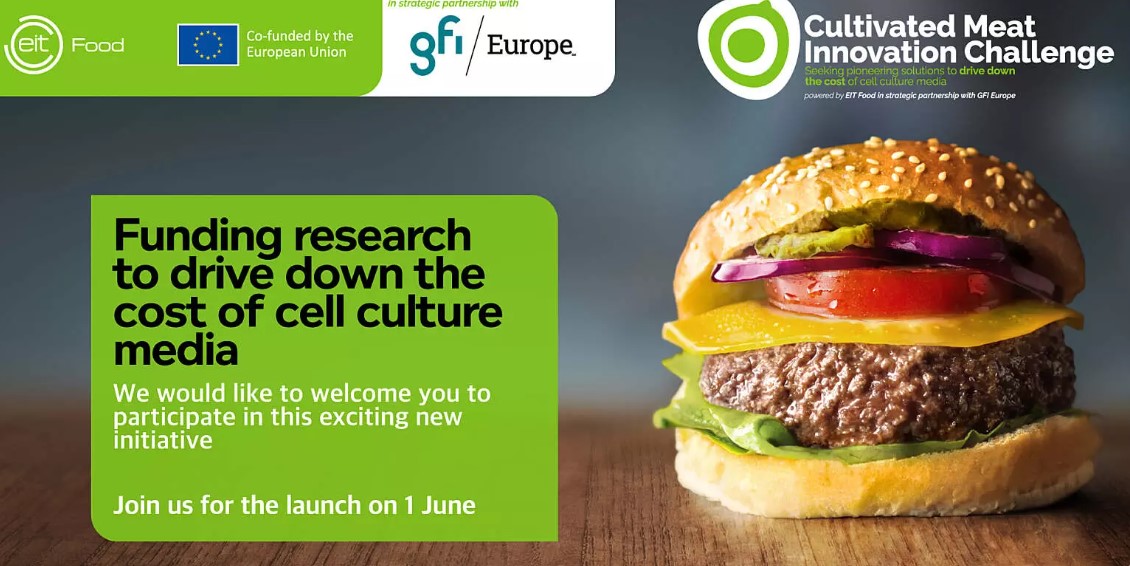Cultivated Meat Innovation Challenge

Seeking solutions to drive down the cost of cell culture media for cultivated meat.
Four projects will be awarded EUR 100 000 each (with the potential for substantially more funding afterwards) to tackle this problem.
Background
Many of us are aware of industrial agriculture's contribution to climate change, antibiotic resistance and the spread of zoonotic diseases. Yet despite rising awareness of the need to make more sustainable choices, demand for meat continues to grow, as taste and price – rather than environmental or health impacts – decide what most people eat.
Cultivated meat has huge potential because it is exactly the same as the beef, pork, chicken and seafood people enjoy eating today – but grown directly from animal cells, instead of farming animals.
This new method of meat production enables the natural process of cell growth, but in a more efficient environment. The result is an abundance of cultivated meat, identical to conventional meat at the cellular level but free of pathogens and other contaminants.
Compared with conventional meat production, meat cultivation has the potential to be far less resource-intensive, decreasing methane emissions, deforestation, biodiversity loss, water use, water pollution, antibiotic resistance, and foodborne illnesses. A recent study by CE Delft – the first ever to be based on data from cultivated meat companies – found that cultivating meat from cells could cut the climate impact by up to 92%, reduce air pollution by up to 93%, and use up to 95% less land and 78% less water compared with farming animals.
With more research and development, cultivated meat could deliver the meat people want in a far more sustainable way.
EIT Food in partnership with GFI Europe have joined together on this Cultivated Meat Innovation Challenge to find ways to make this a reality. GFI has identified the most pressing technical challenges facing the cultivated meat industry and is now seeking your solutions.
Cultivated Meat Innovation Challenge: Seeking Pioneering Solutions to Drive Down the Cost of Cell Culture Media
In terms of scaling up production and bringing down prices, open-access research will be essential to reduce the cost of animal component-free cell culture media, increase the availability of cell lines, improve scaffolding – used to support cell growth and recreate the complex fibrous texture seen in conventionally produced meat – and build larger and more efficient bioreactors for the cells to grow in.
The first of these – animal component-free cell culture media – currently represents the majority of current cultivated meat production costs. While cultivated meat manufacturers and academic researchers have made significant progress in reducing costs and developing medium formulations for various cell types and cultivated species, pricing and large-scale availability of species-specific and food-grade versions of cell culture media components remains a challenge.
We are soliciting proposals which can address this through at least one of the two following approaches:
- Developing media recycling technologies or other ways to remove or metabolise ammonia, lactate, and other waste products in cell cultures.
- Developing a low-cost cell culture media for species-relevant cells that incorporates food-grade hydrolysates and non-animal-based solutions to reduce the need for (or cost of) recombinant proteins and growth factors. Applicants are encouraged to incorporate feed-grade ingredients when possible. The media formulation should perform as well or better than an equivalent serum-containing media based on standard assays for cell growth and proliferation. This could involve some of the following approaches:
- Assessing cell culture media based on plant- or yeast-based hydrolysates to understand the raw material sources that perform best for cultivated meat applications, and provide insights on how to limit variability and improve reproducibility.
- Analysing the performance of feed-grade ingredients in cell culture medium.
- Comparative analyses between species-specific versions of growth factors.
- Exploring methods to reduce the required amounts (or cost) of recombinant proteins and growth factors including, but not limited to: (1) engineering more potent or thermostable variants, (2) developing encapsulated or slow-release systems, (3) using conditioned medium from other animal cell lines, and/or (4) discovering biofunctionally-equivalent plant-based homologues for animal growth factors.
Prize
Up to four winners will each receive EUR 100 000 to develop their solution
In addition to the prizes mentioned above, winners will also receive non-monetary incentives:
- One-to-one mentoring and dedicated feedback on your research proposal from GFI Europe.
- The opportunity to be featured on GFI Europe’s website, blog, and social media with a short description of your project goal(s).
Timeline
Applications can take place from 1 June to 30 September 2022 at 12 am CET (Midnight). Review and selection will take place including a digital presentation and consultation of the most promising initiatives (November 2022).
How to Submit
Applications submitted from any sector (academia, government, industry, start-ups, nonprofits, etc.) and from across Europe will be considered. However, all proposals must have a commercial company that provides a letter of intent for the project (if helpful, GFI hosts a database of global sustainable protein companies, though we also encourage interest from companies which are new to the space).
We strongly encourage proposals from scientists who are new to the alternative protein field. Additionally, we strongly encourage women, people from racial and ethnic minorities, and other individuals who are under-represented in the alternative protein industry to apply for funding through this challenge.
Submit your application between June 1, 2022 and September 30, 2022 at 12.00 am CET (Midnight).
You will have to create an account before filling out the form and answering to the questions requested. You will be able to save a draft version before completing and validating your submission. Once ready to submit, you will be asked to agree with the Rules & Regulations governing the Cultivated Meat Innovation Challenge. The Rules & Regulations document can be found below for your review.


 Share this page
Share this page


